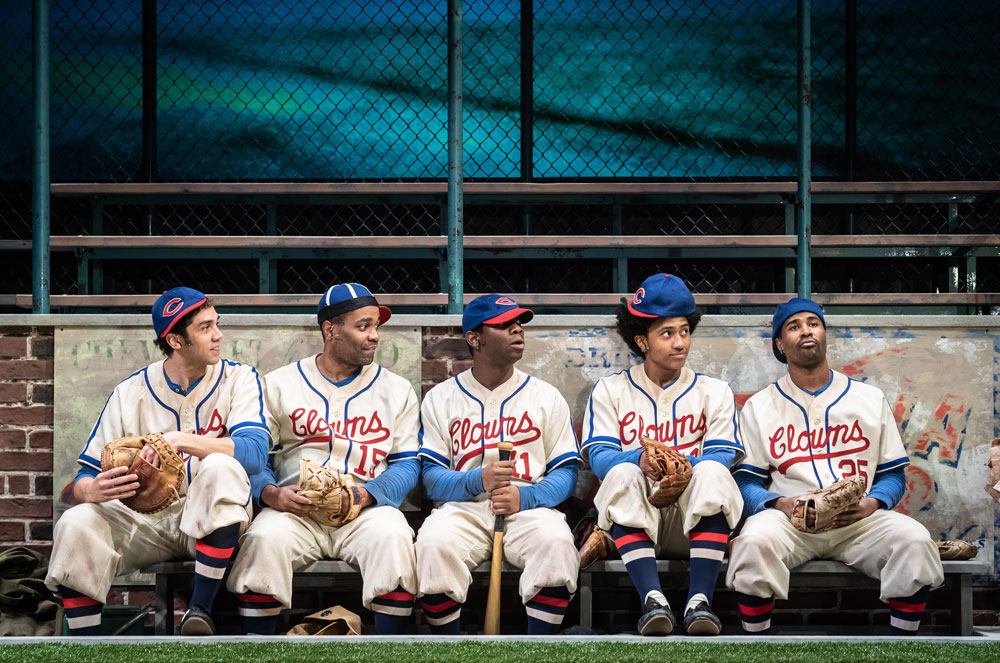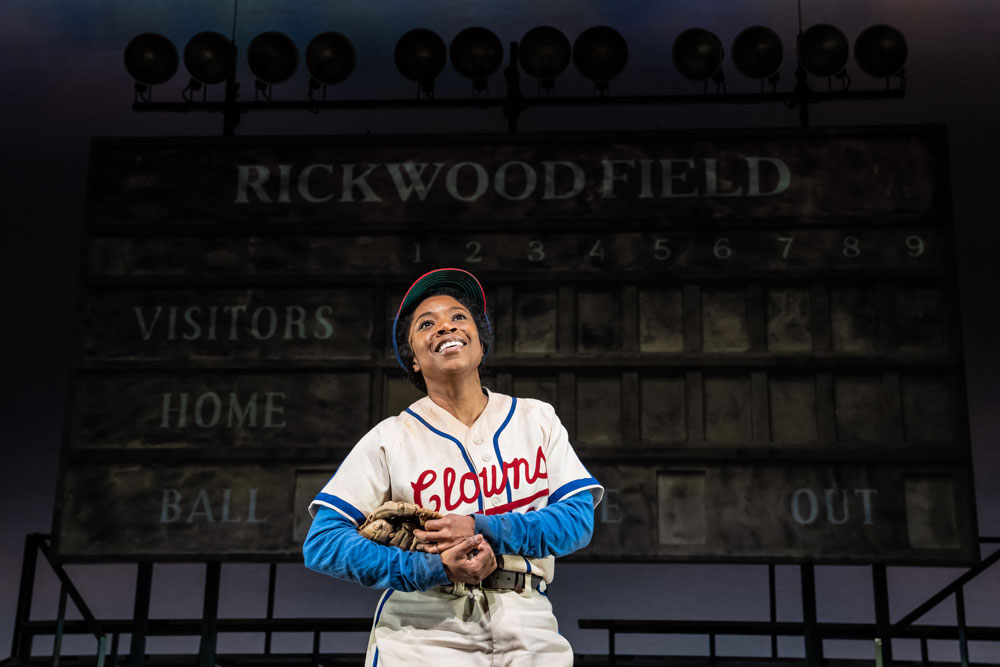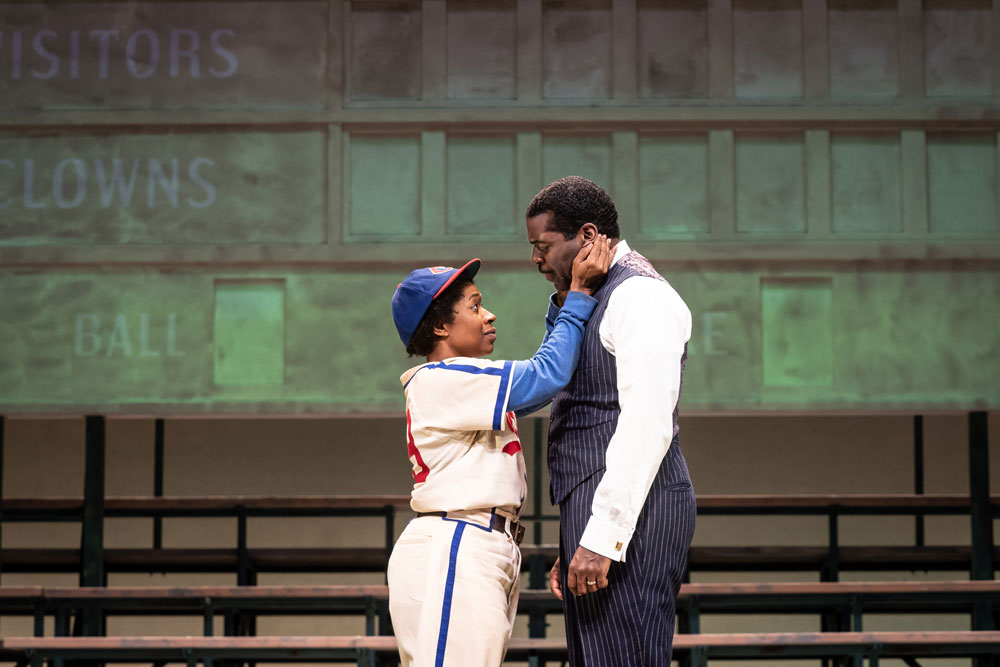
In the 1920s, there wasn’t a lot of “if you can dream it, you can be it” going around. Boxes defining what people could do with their lives were much more rigid a hundred years ago, making it very difficult for some children to even dream of dreaming. Little girls and kids who didn’t have white skin had the fewest options when pondering their futures. But the human spirit, as we so thrillingly see in the Goodman Theater’s current production, Toni Stone, can prove an indomitable force. And few things excite and inspire us more than seeing someone accomplish the impossible by defying the odds and capturing their golden ring.
Toni Stone’s life and accomplishments are astounding on their own. Barriers seldom fall without resistance, and the back story of the first woman to play professional baseball in the United States would necessarily be a compelling narrative. Stories like hers can be forgotten in the constant churn of history. Sometimes it takes the imagination of creatives to refresh our appreciation of the exceptional.
With Toni Stone, It’s very unlikely anyone will forget the drive, persistence and character of a woman most of us never heard of but would do well to emulate. Determined to write a story that would reverberate in our minds and memories long after leaving the theater, playwright Lydia Diamond created a masterpiece in her depiction of a remarkable athlete who accomplished the unthinkable.

Brilliantly directed by Diamond’s longtime friend and collaborator Ron OJ Parson, the drama sounds and moves with the kind of power and assurance you seldom see on the stage. Maybe because the story they devised is as much about baseball as it is about an exceptional woman, Toni Stone bristles with the virility of the game itself. Stone played professionally on all male teams; immersing herself in the hard-knuckled realities of everything that kind of existence implies. Title IX didn’t hit the scene until 1972, veritable light years after Stone was signed to her first professional team, the Indianapolis Clowns, in 1953. The sports world she played in was male and raw. Overshadowing it and the country was Jim Crow. Because the first woman to play professional baseball was also Black, the gamut she ran to realize her dream was littered with an extra set of hurdles.
Full of key details highlighting the people in Stone’s life and the times in which she lived, Diamond’s extensive research adds the kind of flesh and color to this project that make it heave with life. Both survival and success require circumventing barriers to achieve an end. And it’s often attitude that determines whether you cross the finish line. Stone, played with astonishing aplomb by Tracy N. Bonner, was simply irrepressible. Some people know the course they crave for themselves at a very early age and for Stone, baseball held that kind of passion. In her pre-teens, she was playing sandlot hardball. By 16, she had joined a semi-pro all male team, the Twin Cities Colored Giants club. Obsessed with stats and possessing a phenomenal knowledge of the game throughout her career, she constantly looked for ways to improve her game and better her opportunities. Spending so much of her life solely in the company of men may have contributed to her plain spoken and direct style of speaking. So focused on perpetuating and nurturing her career, she wasn’t at all prepared when romance came knocking.

Relationships are the connective tissue that make Toni Stone vital and entrancing. The way she interacts with her fellow players and how she responds to Alberga (Chike Johnson), the man determined to woo and marry her; reveal some of the attributes Stone possessed that engender deep respect and admiration. Because segregation had a strangle hold on the culture when the team traveled their circuit, finding accommodations was a constant challenge. Securing refuge in brothels was common and it’s there Stone met Millie (John Hudson Odom). “Regal”, wise and a kindred spirit living outside the norm, Millie’s ability to not let her pragmatism devolve into bitterness was a testament to her strength and made her a valuable confidant to Stone.

As part of the Negro League, the Clowns were expected to put on a show as well as play stellar baseball. So good were they at that part of the deal, some dubbed them the Harlem Globetrotters of baseball. King Tut (Kai A. Ealy) might play the infectious buffoon between innings, but the insights he’d share on baseball and life off the field would have King Solomon leaning in to for advice. Spec (Edgar Miguel Sanchez) would likely have been a college professor had that door not been barred to him. Not only the intellectual force on the team, he also earned a reputation for his ability to ingratiate himself with women, which becomes an ongoing and very amusing conceit in the play. Bitter and vengeful, Woody (Terence Sims) thinks he’s a better player than Jackie Robinson. Others don’t disagree. But it’s his disposition that’s not ready for prime time. A contentious temperament might be tolerated in a gifted white player, but it wouldn’t fly in a Black player angling for inclusion in the prevailing league.
The kinds of bigotry and hardships Stone and her team faced were presented with the candor and forthrightness deserving of an authentic portrayal of history. Alongside those taut reminders of the past were depictions of tremendous personal fortitude and the kind of will that refused to succumb to taunts and ridicule. Rising above coarse onslaughts and triumphing despite them is a Herculean achievement. Toni Stone honors the dignity and resilience needed to accomplish it. A theatrical trifecta, every pillar supporting the production flashes the Midas touch. A trailblazer’s captivating story, a sterling cast and masterful direction pushed Toni Stone well past excellent entertainment and into the realm of revelation.
Toni Stone
January 28 – February 26, 2023
Goodman Theater
170 N. Dearborn
Chicago, IL 60601